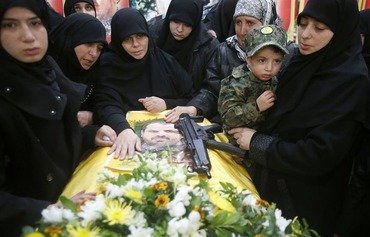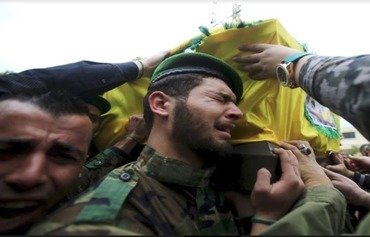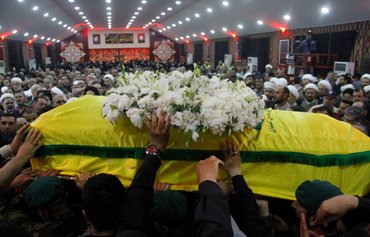BEIRUT -- Mothers of Hizbullah fighters slain in Syria are beginning to break their stoical silence to question the direction the Iran-backed party is taking.
Thousands of young men fighting in the ranks of Lebanese Hizbullah have lost their lives in Syria since 2012, when the party intervened in support of the regime of Syrian president Bashar al-Assad.
But Hizbullah has never publicly disclosed the number of its dead in Syria.
Many say the party is reluctant to disclose the figure out of fear of the public reaction and potential backlash, especially among its traditional base.
![Hizbullah supporters gather around the coffins of fighters killed in Syria during their funeral procession in a suburb of Beirut on March 1, 2020. [AFP]](/cnmi_am/images/2023/04/12/41581-Lebanon-Hizbullah-coffins-600_384.jpg)
Hizbullah supporters gather around the coffins of fighters killed in Syria during their funeral procession in a suburb of Beirut on March 1, 2020. [AFP]
An honest account of its losses would inevitably raise questions from parents about why their sons were sent to be killed in Syria, sources told Al-Mashareq.
Hizbullah has been reticent about the actual number of its dead in Syria "because the truth would spark resentment within the Shia community and the party's incubating environment", a source with knowledge of the party said.
Behind closed doors, the party's traditional supporters are asking "Where is Hizbullah taking us?" the source told Al-Mashareq, asking that his name be withheld out of concern for his safety.
Some households that have been loyal to the party have given "two, three or four martyrs", he said, and are now asking "For how long?" and "What next?"
"These are legitimate questions that we are hearing in homes," he said.
Hizbullah chief Hassan Nasrallah is meanwhile "wary of touching on the subject and does not reveal the actual number of deaths in Syria out of fear of the reaction of the Shia community", the source said.
The party "initially entered the Syrian war with 4,000 fighters, then increased the number to about 15,000, and subsequently mobilised reserves", he said.
The source estimated that the number of Hizbullah fighters who have died in Syria to date, both Lebanese and Syrians, totals "about 10,000, with 3,000 others suffering light and moderate injuries", with some leading to permanent disability.
Most of those who were killed or wounded in battle were between the ages of 20 and 30, he said.
The mothers of slain Hizbullah fighters meet their deaths "with forbearance and silence about their pain", he said, even though Hizbullah, through its Martyrs Foundation, pays out no more than $200 a month in compensation.
No accountability
Hizbullah cannot admit the large number of its dead in Syria, said Asmaa Wehbe, a journalist from the southern town of Kfar Hamam in the Arqoub region who opposes the Iran-backed party.
Many in Lebanon's Shia community "are saying, after more than 10 years of the Syrian crisis, that they have nothing to do with Syria and that it makes no sense for them to send their sons to die there", she told Al-Mashareq.
She said the slogan Hizbullah supporters chant -- "Fida al-Sayed" (A sacrifice for the sake of al-Sayed), in reference to Nasrallah -- and their willingness to offer their sons to fight have changed as the crisis in Syria and Lebanon drags on.
Wehbe said Hizbullah does not feel obligated to provide an account of what happened in Syria to its base, and "it will not do so".
As for the mothers of the dead, Wehbe said, as the Syrian conflict wore on, they now ask "Why are our children dying in Syria?"
"According to our follow-up with the families, the number of Hizbullah fighters killed in Syria, Iraq and Yemen is high, and the party is not disclosing the figure out of fear of the people's anger," said Shia dissident Hussein Ezzedine.
When the families ask about their missing sons, party officials say that they are on "jihad missions", he told Al-Mashareq.
The party's leadership is "in a predicament that it cannot get out of without huge losses", Ezzeddine said, pointing out that whether it declares the missing as martyrs or claims they are on jihad missions, their families will not believe it.

![Relatives of Hizbullah fighters killed in Syria mourn during their funeral in the Ghobeiry neighbourhood of southern Beirut on August 26, 2019. [AFP]](/cnmi_am/images/2023/04/12/41582-Hizbulla-relatives-mourn-600_384.jpg)






